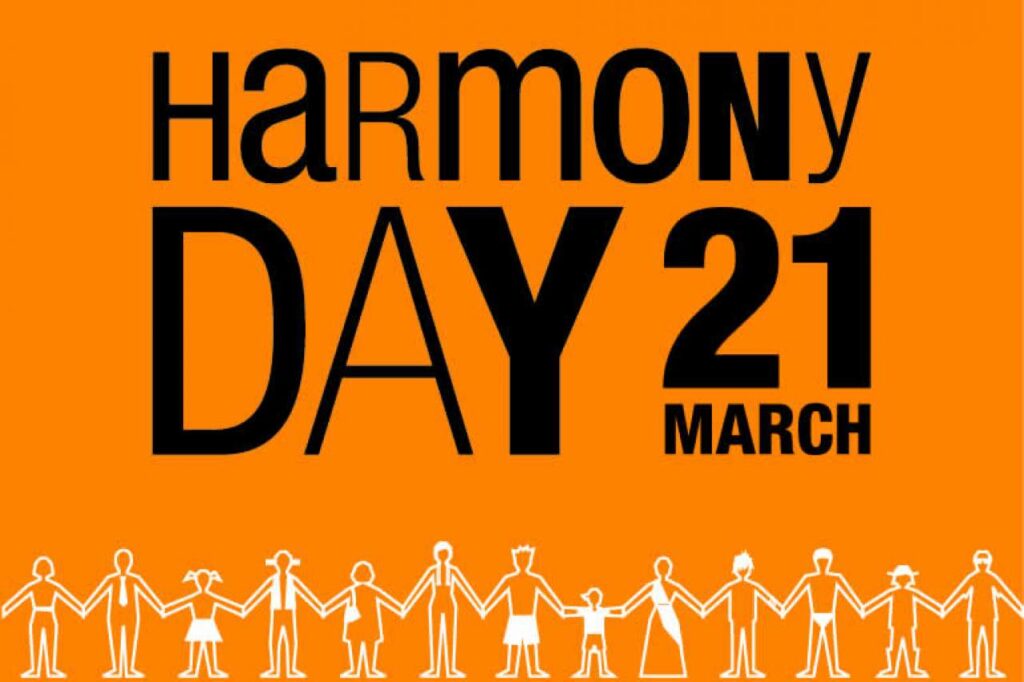
21st of March this year will mark the 24th year that Harmony Day has been celebrated in Australia. Since its inception, the main message of this day is “Everyone Belongs,” an inclusive motto that promotes multiculturalism and diversity. It’s now ‘Harmony Week’.
21st March is also the United Nations International Day for the Elimination of Racial Discrimination – IDERD (and a remembrance of the Sharpeville massacre in South Africa on 21st March, 1960). In present-day South Africa, 21 March is a public holiday in honour of human rights and to commemorate the Sharpeville massacre.
It’s a harder day to ‘sell’. It speaks plainly about ‘what is’ – that racism and racial discrimination still exists, including in Australia.
Harmony Day was introduced in 1998 by the government of the day as a more user friendly, accessible way to promote multiculturalism and harmony. It has positive connotations of cooperation, inclusiveness, belonging, mutuality, respect, understanding. Such positivity is to be applauded, but not at the expense of naming the reality that underlies the day.
(Read this article for a longer history about the development of Harmony Day, including the Eureka research findings).
The Hon Andrew Giles MP, Minister for Immigration, Citizenship And Multicultural Affairs, has issued this statement for Harmony Week 2023 where he includes an appeal to the international community to step up its efforts to eliminate all forms of racial discrimination.
“Welcome to a week of celebrating our wonderful, diverse and vibrant multicultural society. We’re privileged to share this beautiful country with the world’s oldest continuing culture. This is a fundamental part of who we are.
For more than 60,000 years First Nations peoples cared for country. Appreciating and understanding this truth is a vital part of what it means to be Australian.
We’re also a majority migrant nation. In 2023 more than half of all Australians were born overseas, or have a parent who was. We have different backgrounds and life experiences, but we all believe in our shared values based on freedom, respect, fairness and equality of opportunity.
Harmony Week also begins with International Day of the Elimination of Racial Discrimination; a day that called on the international community to step up its efforts to eliminate all forms of racial discrimination.
We’ve come a long way as a nation but there is still much more work to do. We’ve grown and we’re increasingly not afraid of having difficult conversations about our past, present and future, of questioning our ways and acknowledging our mistakes, and finding new ways to live better, in harmony.
We’re working together to ensure diversity and equity are part of our everyday reality. It starts with little things. Whether it’s at school or the workplace, at our many cultural or sports centres, this Harmony Week share an aspect of your culture, engage in meaningful conversations, make an effort and learn something new.
Happy Harmony Week”.
The Federation of Ethnic Communities’ Council of Australia (FECCA) writes:
We believe it is important to acknowledge that racism exists and that we should all work collaboratively to eliminate it. It is time that the community reclaim the original UN-declared day, rather than undermining lived experiences of racism in favour of promoting the idea of harmony. In the process, we can still celebrate the great diversity of cultures that makes Australia unique, and without addressing racism, we will not achieve harmony.
One of the first steps in overcoming racism is naming the problem, and this is one day of the year in particular where this should be done.
The United Nations theme for 2023 focuses on the urgency of combating racism and racial discrimination, 75 years after the adoption of the Universal Declaration of Human Rights. This is an opportunity for Australians to reflect on the nation’s history of racism and recommit ourselves to implementing strategies that tackle this complex issue.
The Challenging Racism Project in a 2015-2016 survey found that 20% of Australians surveyed had experienced racial discrimination in the form of race hate talk, and 5% had been attacked due to their race. This is particularly relevant amongst First Nations peoples, as the 2022 Australian Reconciliation Barometer published by Reconciliation Australia revealed that 60% of Aboriginal and Torres Strait Islander people had experienced at least one form of racial prejudice in the past six months.
Furthermore, Australians are becoming increasingly aware of the prevalence of racism in their country, as according to a report compiled by the Scanlon Foundation Research Institute, 60% of respondents thought that racism in Australia was a ‘very big’ or ‘fairly big problem’, compared to 40% only a year prior.
Everyone has a part to play in shaping the Australian culture, and contributing to a society that is fair and equal – for all. This IDERD, let us unite to reshape the meaning behind the day, understand the roots of racial discrimination and inequality in Australia, challenge the status quo, and take action to create positive change within our communities. In the process, we can still celebrate our rich multicultural tapestry.
The following resources discuss the history of Harmony Day and the reframing to IDERD, and what meaningful action you can take to fight racism today, and every day.
Resources:
- Racism. It Stops With Me. – Australian Human Rights Commission
- Fight Racism – United Nations
- Fact Sheet – International Day for the Elimination of Racial Discrimination – Australian Human Rights Commission
- Harmony Day should not be used to sweep racism under the rug – Queensland Human Rights Commissioner, Scott McDougall (Sydney Morning Herald)
- It’s Harmony Week, but let’s discuss what it is really about: racism – Erwin Renaldi (ABC)
- Racism at work: a call to anti-racist action for Australian organisations – Peter Anderson (The Conversation)